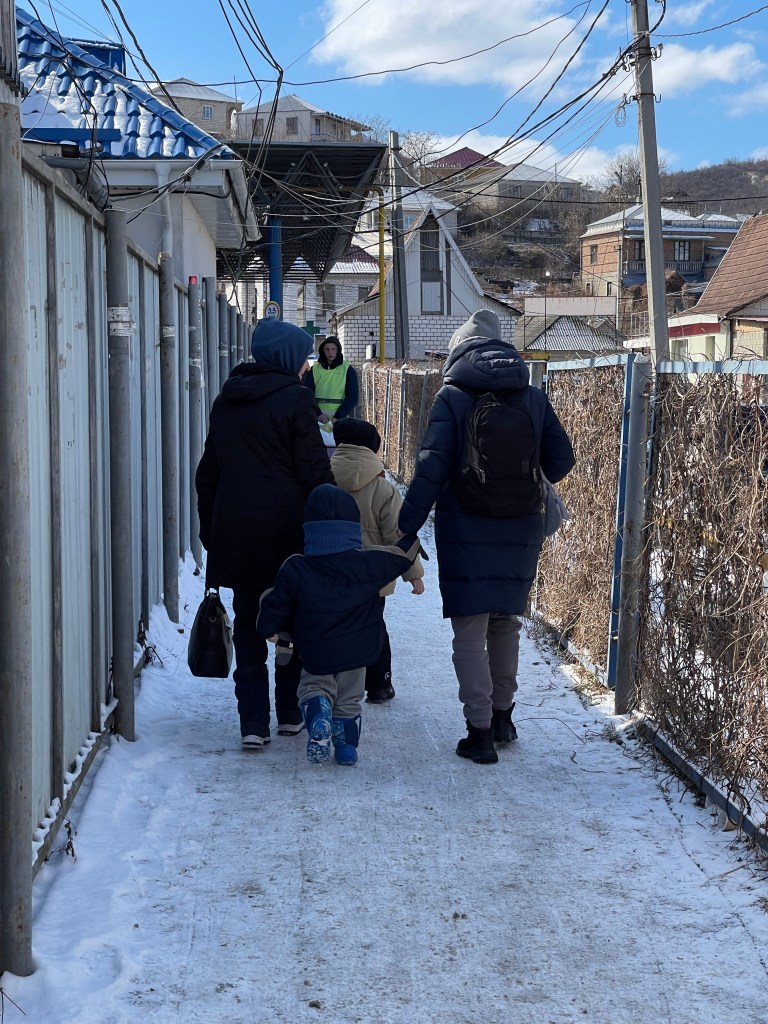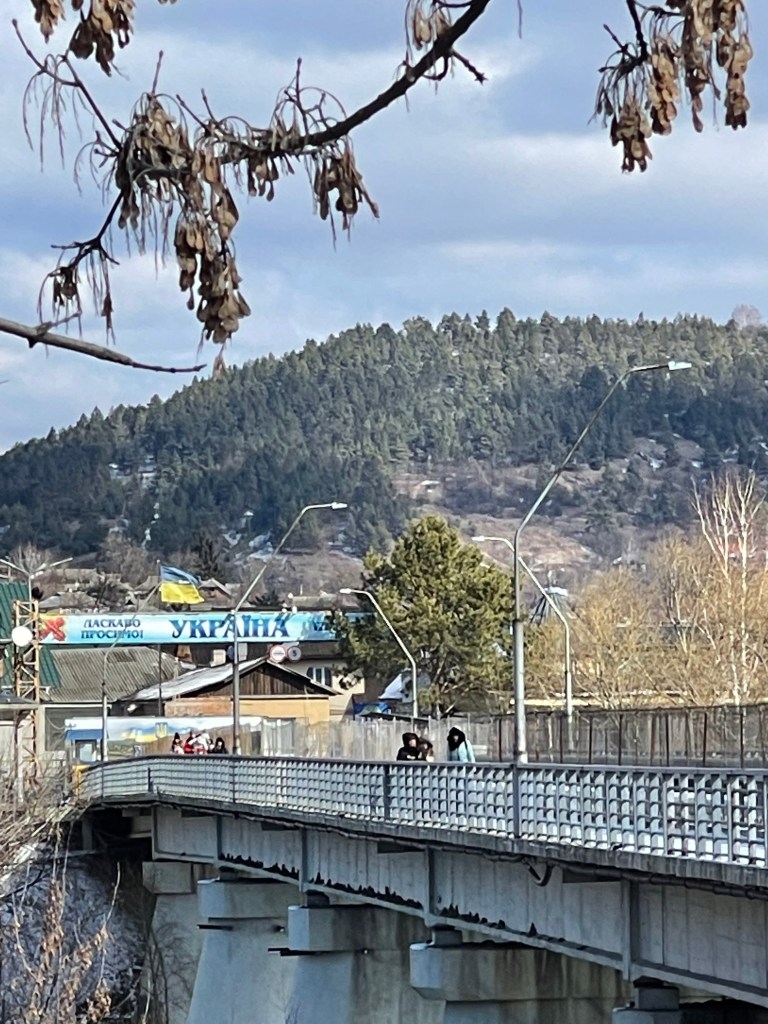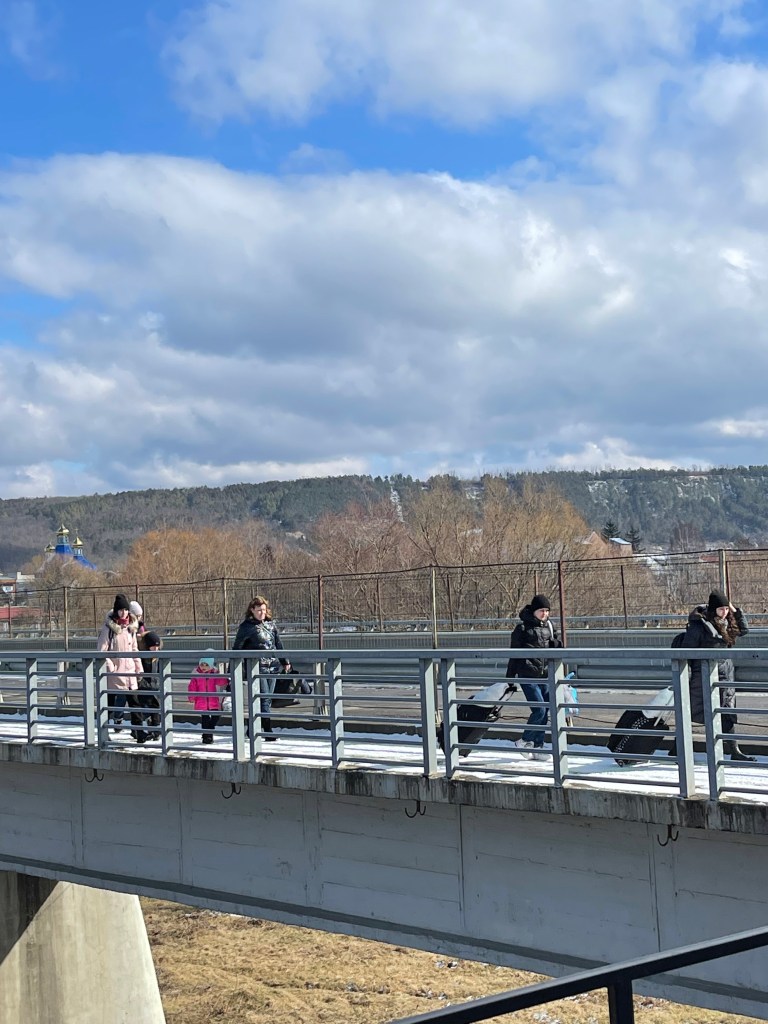Crossing the bridge in Otaci is a nightmare with the frigid winter weather that has once again descended across Moldova.
One of my dear Moldovan friends is now working for an NGO that is distributing aid and helping organize volunteer efforts to serve Ukrainian refugees in Moldova; she watched, heartbroken, as a mother “weeping, her face destroyed,” traversed the bridge with a young child in her arms.
There are refugee sites set up across the country from the north to the south. People are converting old boarding schools and kindergartens, and setting up tents, to house the people who are fleeing.
In Moldova’s northern Ocniţa district at the town of Otaci, which is split between Ukraine and Moldova, the situation is dire. There is not the same aid, nor the same amenities, as are found in Palanca on the Eastern border of Moldova (directly west of Odessa). In order to travel into Moldova at Otaci, people cross a bridge by foot from distances of a kilometer or more.

According to statistics from the UN Refugee Agency, as of March 10, almost 105,000 refugees have entered Moldova; also on March 10, IOM UN Migration reported that over 300,000 have entered the country and 83,000 have decided to stay.
But there are few places for those who want to remain in the territory, my friend said, and the services for refugees are entirely dependent on volunteers. People of Roma ethnicity tend to stay in Moldova because they have no recourse to find accommodation in Europe, and the free housing and supplies provide needed respite. She also said that many of those who remain in Moldova are hosted in private homes.
While money is arriving from the United States and Europe, the distribution is desperately slow. Mayors who have taken on the mantle of welcoming and housing Ukrainians are “crying,” my friend said, because they are not yet receiving funding. People are asking: how long can we continue with these efforts? Moldova is a poor country, and without proper aid they will not make it another month. Over a week ago, Moldovan Prime Minister Natalia Gavrilița requested more financial assistance from the West.


Martial law has been imposed in Ukraine and prevents men between the ages of 18 and 60 from evacuating. There are rumors that there are some men, however, who bribe Ukrainian officials before crossing into Moldova – but even this is supposedly becoming impossible. The taxi drivers are gossiping that prohibitive costs of bribes for men to enter the country have risen from approximately 200 euros to 2000. The Washington Post has reported that men of fighting age do manage to leave, albeit rarely; the article cited bribes of up to 7,500 euros.
Religious sects from both within and outside of Moldova, including Jehova’s Witnesses and Baptists, are organizing to aid volunteers. In Otaci, they have tents with signs advertising hot tea. Evacuees can come to rest, drink, and eat before continuing to other parts of Europe.
In Chisinau, Moldova’s capital, there is another site that could house up to 100 refugees as of March 1. They have converted the Moldexpo exhibition center, using booths where people would normally sell their wares or promote their businesses to house refugees. They place beds in the stalls and hang sheets over the entrances to provide a modicum of privacy.

Richer Ukrainians at first flocked to the hotels in Chisinau on their way out of their country. Hotels have since tripled prices for a stay. While a week in the Radison for four people may have cost 1000 euros, my friend said, the price for the same duration of stay is now 8000.
Comrat, the capital of the Autonomous Territory of Gagauzia, is not currently housing refugees. This, in part, is because they do not have the proper facilities, but they are partnering with people in the towns of Congaz, Besarabeasca, and Taraclia to provide services. In Congaz, people are staying in an old boarding school that was also formerly an orphanage. It was shut down two years ago, but they have the proper amenities – beds, showers, heating. Volunteers removed desks from old classrooms and placed beds inside them.
There is a hotel in Congaz that has also welcomed refugees that has capacity for only 25 people. The first night, the owner took in 100. While she could not find space for everyone to rest, she allowed them to sleep in their cars on the premises; she fed them all. Most of the people in these cars are women, and the vehicles are stuffed with kids. Neighbors or relatives who cannot leave Ukraine are sending their children this way.
Even if this war stops, my friend said, it will not be the end of the refugee crisis. People will continue to flee, and some will decide to return to Ukraine. Moldova will continue to need aid.
Sources:
https://data2.unhcr.org/en/situations/ukraine
https://www.pravda.com.ua/eng/news/2022/02/24/7325577/
https://www.washingtonpost.com/world/2022/03/09/ukraine-men-leave/


Published by